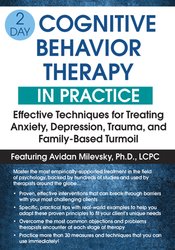

Do you have a client who everyone else has given up on?
They’ve seen multiple therapists; without the relief, they want and deserve. Maybe you feel stuck with this client – and at this point, even the client believes they are not capable of getting better.
You can offer them hope…with practical interventions that are proven to WORK!
Evidence points to Cognitive Behavioral Therapy (CBT) as one of the most effective treatments for many chronic, recurring, and challenging mental health conditions.
If you’ve been using CBT skills and aren’t getting the response you expected, then don’t miss this opportunity to master a fresh set of clinical tools and skills that will transform your practice. This is NOT a “one-strategy-fits-all” approach.
This CBT course offers you a complete collection of practical ways to integrate this empirically supported approach in your very next session.
| File type | File name | Number of pages | |
|---|---|---|---|
| Manual - 2-Day Cognitive Behavior Therapy in Practice (3.2 MB) | 67 Pages | Available after Purchase | |
| Manual - 2-Day Cognitive Behavior Therapy in Practice - French (3.2 MB) | 67 Pages | Available after Purchase | |
| Manual - 2-Day Cognitive Behavior Therapy in Practice - Italian (3.2 MB) | 67 Pages | Available after Purchase |

Avidan Milevsky, PhD, LCPC, has over 20 years of experience specializing in the broad application of cognitive behavioral interventions for multiple client difficulties. He is an associate professor of psychology at Ariel University and a psychotherapist at The Center for Mental Health in Bet Shemesh, Israel. He also serves as a psychotherapist at Wellspring Counseling in Towson, MD.
His clinical research has produced over 100 conference presentations, more than 30 papers in peer-reviewed journals, and six books including Will I Ever be Happy Again, Understanding Adolescents for the Helping Professional, and Sibling Issues in Therapy.
Dr. Milevsky has lectured to audiences in the United States, Canada, South America, Europe, and the Middle-East on various topics including cognitive behavioral interventions for individual and family issues, parenting, sibling relationships, and the intersection between spirituality and mental health.
He has been interviewed by national media about his work including stories in The Washington Post, The Wall Street Journal, The Associated Press, Real Simple, and Allure magazine. Additionally, Dr. Milevsky is a columnist for Psychology Today and The Huffington Post on well-being issues. He has been a guest expert on TV and radio including an appearance on Public Radio International’s “The Takeaway.”
Speaker Disclosures:
Financial: Dr. Avidan Milevsky has employment relationships with the Judah District, Ariel University, and Wellspring Baltimore. He receives royalties as a published author. Dr. Milevsky receives a speaking honorarium and recording royalties from PESI, Inc. He is a paid consultant for Evergreen Certifications. He has no relevant financial relationships with ineligible organizations.
Non-financial: Dr. Avidan Milevsky is a member of the American Psychological Association, the Association for Psychological Science, the Eastern Psychological Association, and the Society for Research in Child Development.
CBT Checklist
Techniques Used in CBT
Cognitive Tools and Strategies
Modifying Rigid Cognitions and Core Beliefs
Behavioural Tools and Strategies
Offshoot Models and Third Wave Approaches
CBT for Depression and Suicide
CBT for Anger
CBT for Anxiety
CBT for Trauma and PTSD
Family Turmoil and the Cognitive Model
Application to Clinical Practice with Case Studies and Role Plans
Please wait ...